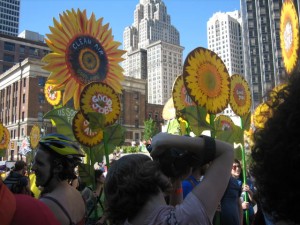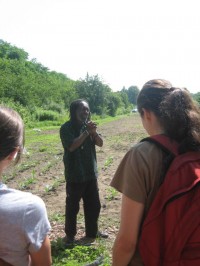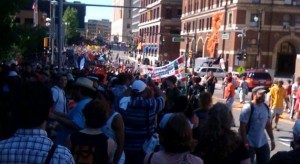Jul
21
2010

Over 15,000 organizers, activists, and social service nonprofits gathered in Detroit, MI at the second United States Social Forum to build unity around common goals of social justice, strengthen ties between organizations, and help build a broader social justice movement. It was not a conference, but rather an open space for people and groups to blend their ideas and energy on solutions to the economic and ecological crisis.
Social Service & Social Change: A Movement Building Strategy The Building Movement Project kicked off our involvement in the US Social Forum with an interactive workshop exploring strategies for bridging the traditional divides between service providers and community organizing. About 25 individuals representing a wide range of organizations, regions and issue areas joined us to discuss what they identified as both the barriers and the opportunities around this work. After much animated discussion, the dominant message that emerged was that the current, seemingly unprecedented confluence of crises (joblessness, environmental crises, economic crises) coupled with an increased sense of openness to new approaches for addressing these crises makes this a ripe moment for building movement through nontraditional alliances. (For more on this topic, see our report Alliances for Change: Organizing in the 21st Century.)



Emerging Strategies to Re/Claim the Commons Building Movement Project, in partnership with many groups (including sponsor OnTheCommons.org), participated in a People’s Movement Assembly, which drew over 70 participants from all over the US and the world. The goal was to learn from one another’s efforts to create and claim commons in our communities, and strengthen those efforts by sharing challenges and strategies, and building alliances moving forward. Each Assembly ends with a set of resolutions meant to call other USSF participants to action, and to name strategies for advancing this movement after the Forum. You can find the full text on the USSF PMA website, but we wanted to share some of the key resolutions that were generated, specifically around what is required in order to claim the commons: * Repairing and rebuilding community relationships damaged by injustice, inequity and disconnection. * Teaching ourselves to become stewards rather than only consumers * Creating the means, policies and rules that lead to equitable community resource sharing and ownership * Developing resource governance that is participatory, transparent and collaborative as well as appropriate to that particular commons In the coming month, we will be featuring the work of some of the partners who helped organize the commons PMA and highlighting the strategies they have been using to reclaim their commons.
